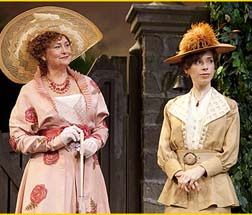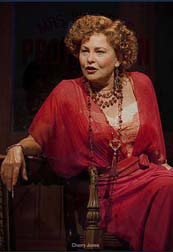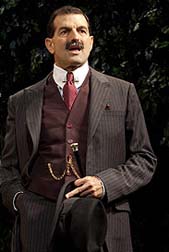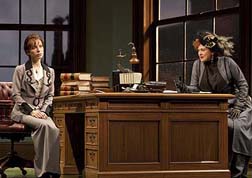Lucy Komisar
|
 |
| Cherry Jones as Mrs. Warren and Sally Hawkins as her daughter Evie. Photo by Joan Marcus |
There's the irony: the outcasts of a society that marginalized women become part of the system by taking on male roles: the entrepreneur and the professional.
On the other hand, Frank Gardiner (Adam Driver), the son of the local social-climbing minister, is just the sort of frivolous wastrel that women of that class were supposed to be. He is courting Vivie, but he doesn't want to work, which hardly endears him to her. Rev. Samuel Gardner (Michael Sieberry) wants him to marry someone with social position--just like women were supposed to do.
 |
| Jones as Kitty Warren. Photo by Joan Marcus |
Jones as Mrs. Warren is the mouthpiece for Shaw's views about marriage. She can be a seductive floozie in red chiffon gown and curly red hair. She asks, "What's respectable? As if a marriage could make any difference. The hypocrisy makes me sick." She compares the bordello to marriage: "It's not work anyone would do for pleasure."
But, "The only way for a woman to provide for herself decently is marriage or the whorehouse." "It can’t be right that there shouldn't be better opportunities for women."
Compare that to the "morality" of the people at the top. Crofts point out to Vivie: "Do you remember your Crofts scholarship at Newnham? Well, that was founded by my
 |
| Mark Harelik as Sir George Crofts. Photo by Joan Marcus |
brother the M.P. He gets his 22 per cent out of a factory with 600 girls in it, and not one of them getting wages enough to live on. How d’ye suppose they manage when they have no family to fall back on? Ask your mother. And do you expect me to turn my back on 35 per cent when all the rest are pocketing what they can, like sensible men? No such fool! If you’re going to pick and choose your acquaintances on moral principles, youd better clear out of this country, unless you want to cut yourself out of all decent society."
Vivie [conscience stricken] "You might go on to point out that I myself never asked where the money I spent came from. I believe I am just as bad as you."
He points out, "As long as you don’t fly openly in the face of society, society doesn’t ask any inconvenient questions; and it makes precious short work of the cads who do."
The play, which was banned in New York for its "immorality," is of course a morality play through and through. Except it's not the morality of the people who ran the system then, or now.
 |
| Sally Hawkins as Evie Warren and Cherry Jones as her mother, Kitty, in Evie's office. Photo by Joan Marcus |
Director Doug Hughes has mounted a terrific production, with two unforgettable women who are nevertheless completely different--the biting, sparks-flying Jones as Mrs. Warren and a cool, reserved Hawkins as her daughter. Compared to them, the men hardly register. They are played appropriately by Driver (Frank), Harelik (Crofts), Siberry (the Reverand) and Edward Hibbert as a visiting friend Mr. Praed so that they are almost nonentities compared to the two strong women.
Scott Pask has created a fabulous set, with the outside of the Warrens' bourgeois red brick house and a proper high hedge, a pine paneled drawing room, the Reverend's house and garden, and Evie's power office.
It's a classic which you shouldn't miss.
| lobby | search
| home | cue-to-cue |
discounts | welcome | film
| dance | reviews
|
| museums |
NYTW mail | recordings |
coupons | publications |
classified |

